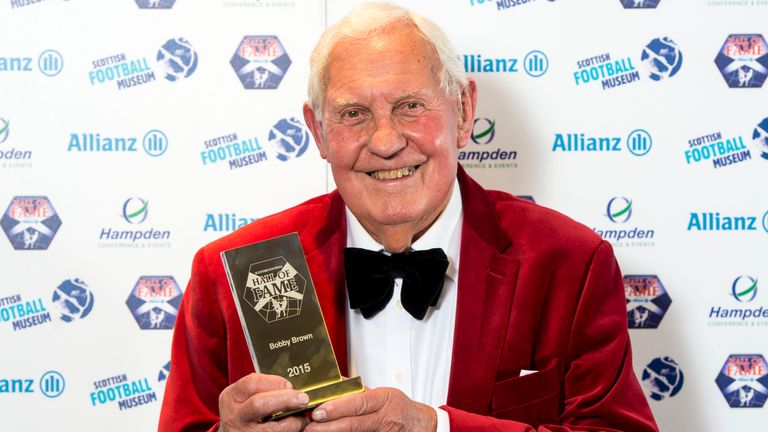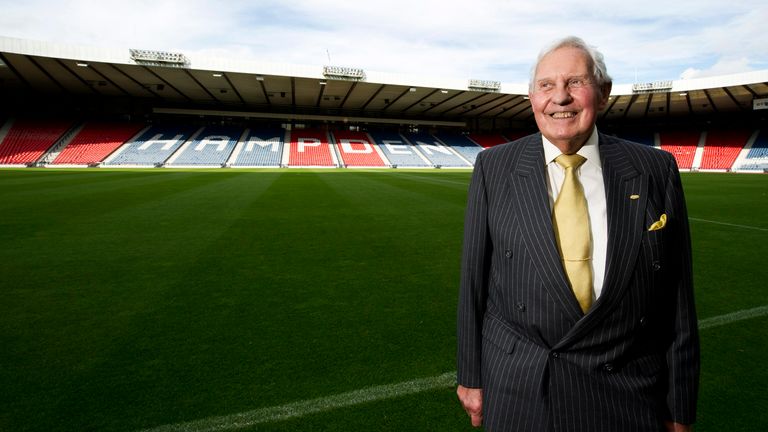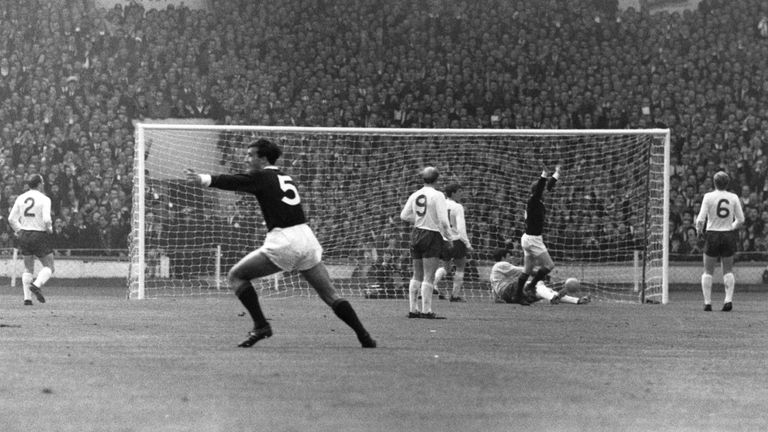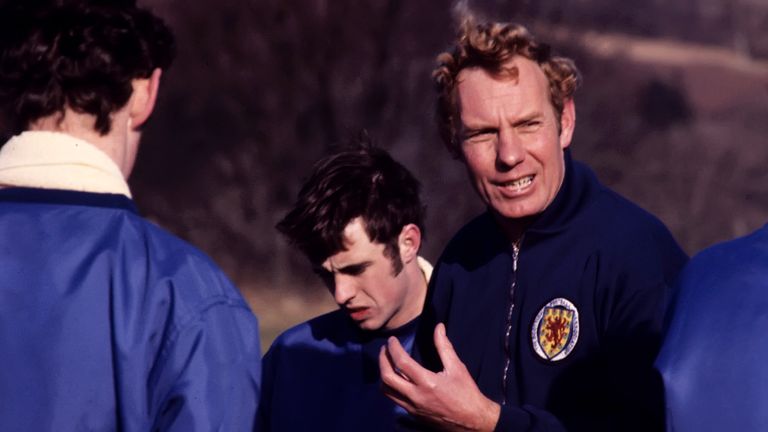Bobby Brown: Scotland and Rangers legend dies aged 96
Wednesday 15 January 2020 22:24, UK
Former Scotland manager and ex-Rangers goalkeeper Bobby Brown has passed away at the age of 96.
During his playing days, Brown was a member of the Light Blues' famed Iron Curtain defence and he later he went on to manage the national team to their greatest ever victory - the 1967 Wembley win over world champions England.
Brown joined Bill Struth's team from Queen's Park in 1946 and went on to make 296 appearances, while keeping 109 clean sheets, in his decade at Ibrox.
Indeed, for six years - between August 10, 1946 and April 16, 1952 - he did not miss a league match, playing in 179 consecutive games.
He won three league titles, three Scottish Cups and two League Cups and was an ever-present during the 1948-49 season when Rangers became the first team in Scotland to win the treble.
He was inducted into the Rangers Hall of Fame in 2002 and the Scottish Football Hall of Fame in 2015.
Rangers chairman Dave King said: "All of us connected with Rangers are deeply saddened to hear that Mr Brown, a genuine Rangers and Scotland legend, has passed away. Our thoughts are with Mr Brown's family at this time.
"He was a wonderful servant of our club and we will remember him with great fondness. He was a gentleman of the game and set standards which typify what Rangers is about."
Scottish FA president Rod Petrie said: "I was deeply saddened to learn of the passing of former Scotland player and manager Bobby Brown.
"Bobby holds a special place in the hearts of all Scotland supporters. He not only played for his country, becoming the last amateur player to earn a cap for Scotland, but would go on to become the nation's first full-time manager, a role he fulfilled for four years.
"Though he served his country with distinction throughout, he is probably best remembered for his first match at the helm of the national side, when he led the team to victory over the reigning world champions England at Wembley in an iconic match that has gone down in the annals of history for all Scotland fans.
"A true legend of the Scottish game, it was only fitting that he was inducted into the Scottish Football Hall of Fame in 2015. He will be remembered fondly by all Scotland fans and the thoughts of everyone at the Scottish FA are with his family at this difficult time."
A minute's silence in memory of Brown will be held prior to Rangers Scottish Cup tie with Stranraer at Ibrox on Friday.
The man who made Scotland 'unofficial champions of the world'
When Scotland needed a safe pair of hands to become their first ever full-time boss, Bobby Brown was the man Hampden chiefs turned to.
The hope was that Brown, who died on Wednesday aged 96, would produce a side as hard to beat as he himself had been during his playing days, when he formed part of Rangers' famed Iron Curtain defence.
But as it turned out, Brown's stint in charge of the Scots started off not only with arguably the country's greatest ever win, but a swashbuckling performance that has gone down in national folklore.
The 3-2 triumph over Alf Ramsey's World Cup winners in April 1967 might not have dethroned England but it was enough for the Tartan Army to crown itself the "unofficial champions of the world".
Amid the summer of love, Scotland were seen cavorting across the Wembley turf as thousands of Scots who had made their way south watched on awestruck.
No one man had ever wielded so much power when it came to dishing out Scotland caps as Brown until that point, with the national team previously chosen by a committee.
He handed a debut to veteran Celtic goalkeeper Ronnie Simpson - his former Queen's Park understudy - and also threw in teenager Jim McCalliog for his first cap. His reward was seeing the Sheffield Wednesday youngster net the winner.
Jim Baxter, whose career was on the slump after leaving Rangers, wound back the clocks with an imperious display capped off by his brazen ball-juggling act.
"We should have had five or six," said Brown in a book about his career released in 2017. "Without a doubt it was the best managerial debut I could have been given."
Not that his big achievement earned him instant fame. As his squad partied the night away after the match, he stepped out of their London hotel for a breath of fresh air where he bumped into a rather lubricated member of the Tartan Army.
"See you, Scotland 3 England 2 - we beat you easily today and don't ever forget it", declared the fan unawares he was jabbing his finger into the chest of the man who had masterminded the whole affair.
Brown was born in the small Stirlingshire village of Dunipace in March 1923. His journey to footballing success began when he would join the men from his village for "challenge" matches against nearby parishes. Being the youngest at just 11 years old, he was put in goal but the pint-sized stopper was no weak link.
At school, his talents were shaped by his PE teacher Hugh Brown - whose son Craig would follow in Bobby's footsteps by becoming Scotland manager.
It was in 1939, at the age of 17, that he got a "bolt from the blue" after helping his school Falkirk High claim a 3-1 win over St Aloysius. At the full-time whistle, two strangers raced onto the pitch and announced that he was required by Queen's Park later that afternoon to face Celtic at Parkhead.
The pair turned out to be scouts for the Spiders and so it was that Brown, just hours after turning out for his school, made his senior debut in a 4-4 draw against the Hoops.
He would continue to represent Queen's Park during the war despite being posted to Portsmouth after signing up for the RAF, while also guesting for the likes of Chelsea and Plymouth Argyle.
His displays in inter-service matches also propelled him to prominence and, after being demobbed back to Scotland at the end of hostilities, he was handed his first Scotland cap in a friendly with Belgium in January 1946, with Brown remaining the last amateur to play for Scotland.
It was his move to Ibrox later that year that saw him link up with defenders George Young, Jock Shaw, Willie Woodburn, Ian McColl and Sammy Cox as they formed the Gers' notoriously stingy rearguard.
Together their efforts in shutting out rivals helped Brown win three league titles and three Scottish Cups over the next decade before ending his playing career at his boyhood club Falkirk.
A move into management followed in 1958 as he took over at St Johnstone, with his steady leadership of the Perth club seeing them twice promoted to the top-flight during a nine-year spell in charge.
It was that dependable record that convinced the Scottish Football Association to hand him the national team reigns.
However, having achieved so much in his first game in charge, it was always going to be difficult for Brown to top that achievement.
In all he managed Scotland 28 times before his frustrations with repeated call-offs led him to resign in 1971. He would oversee just eight further victories following his Wembley success.
After a brief stint as Hull boss and a scouting assignment with Plymouth, Brown spent his later years based in Helensburgh with his late wife Ruth where they ran a restaurant and a number of gift shops.





